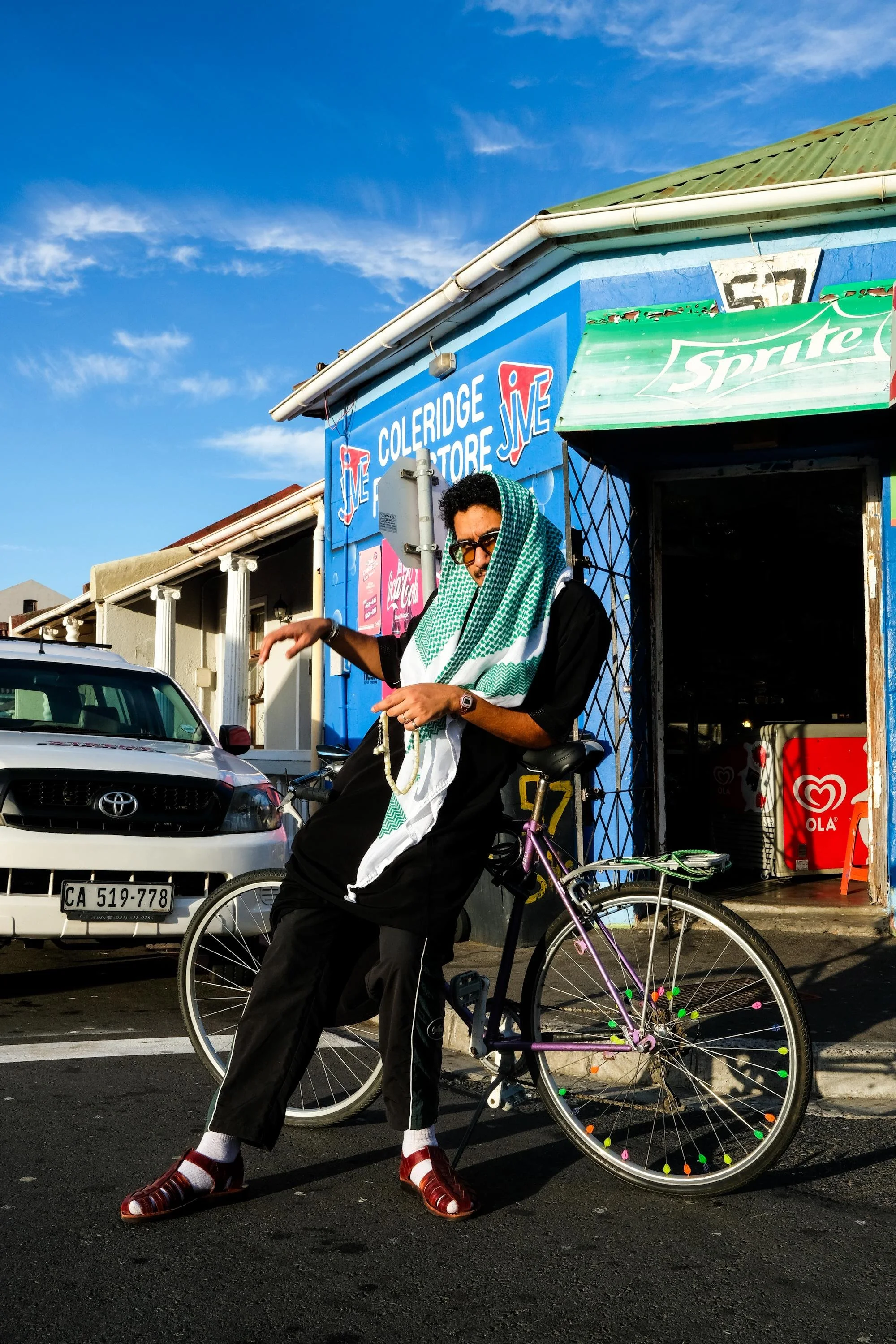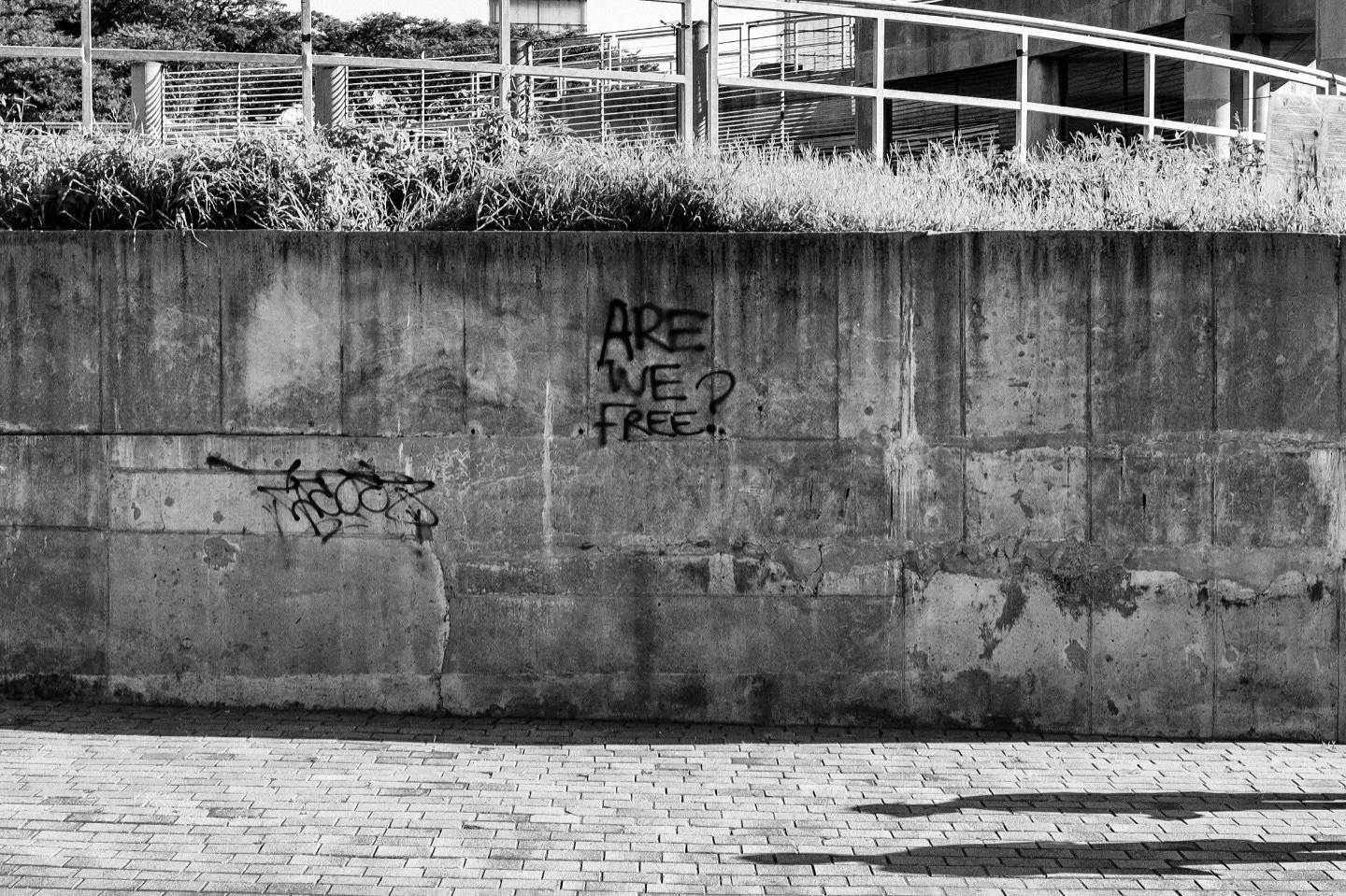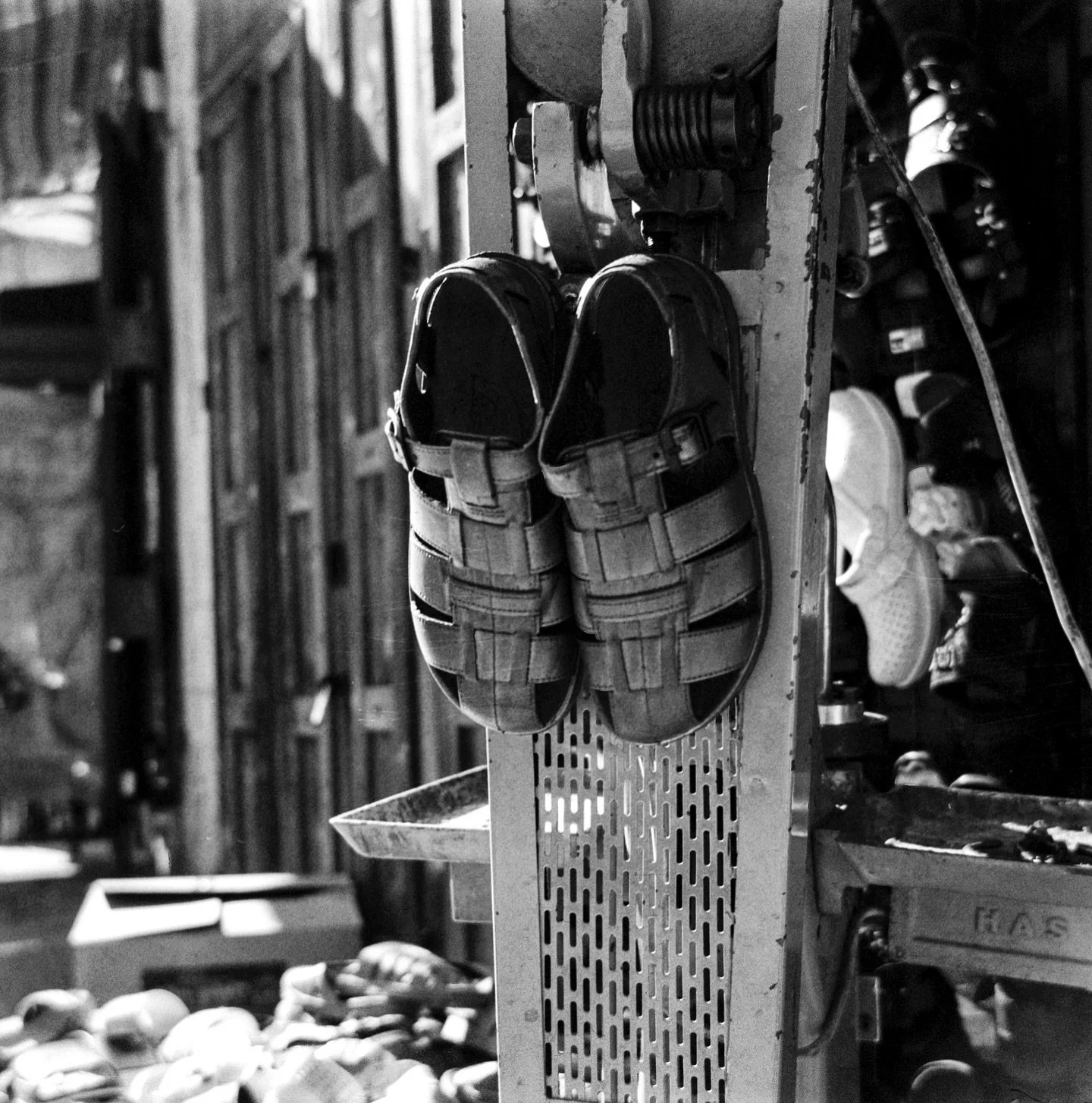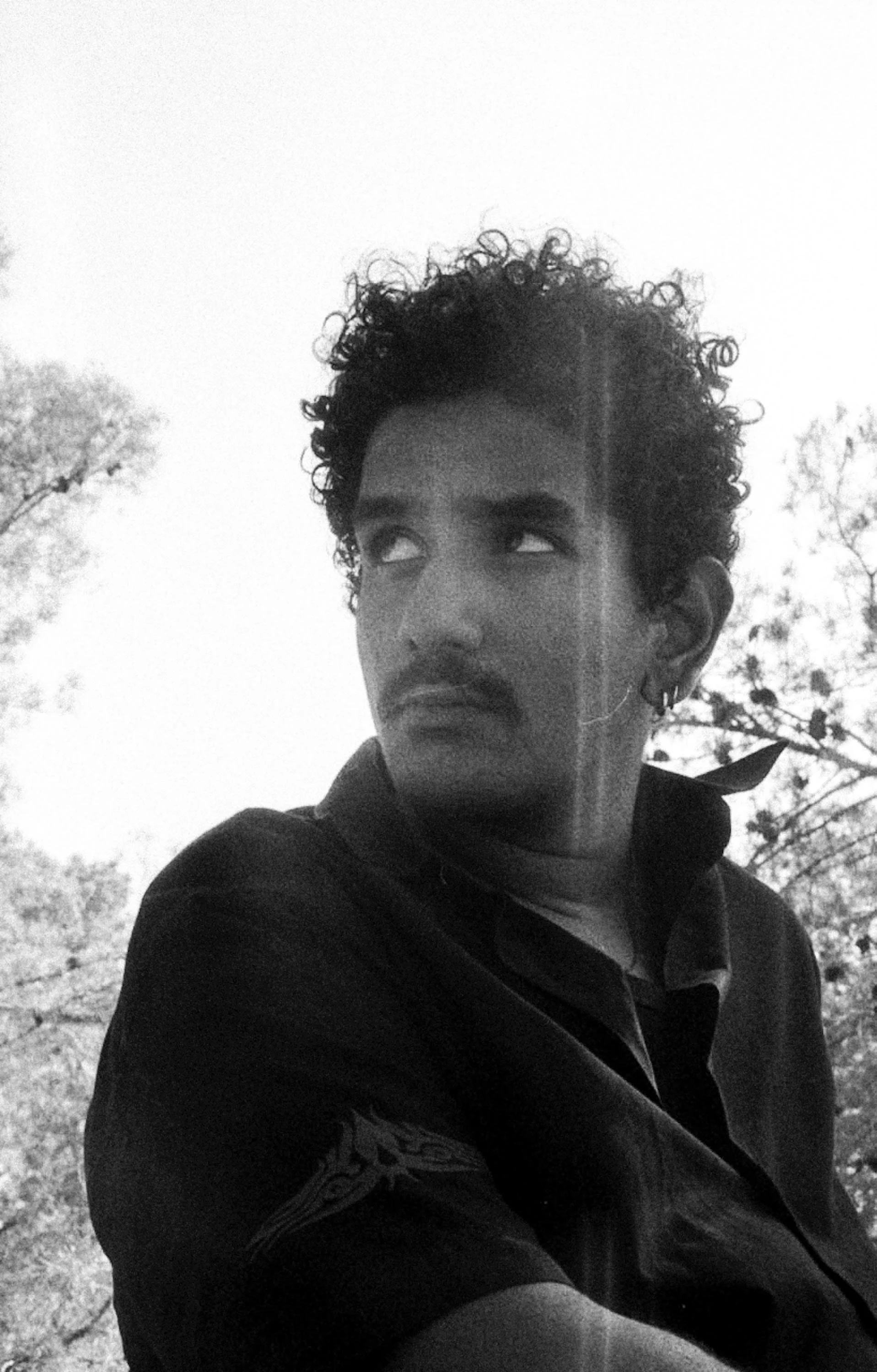BAHA SULEIMAN: ARTISTIC PRACTICE AS EXISTENTIAL RESPONSE
“The art is that bigger thing for me”
Interview by Emily Freedman
Photography courtesy of Baha Suleiman
Suleiman is one of the most capacious people I have ever met. Full of humour, anecdote, talent and insight. This was the longest interview I have done yet, and after two hours of speaking I truly felt we had barely scratched the surface. He works consciously from his positionality- as a Palestinian-Jordanian artist- and at the same time, against tokenisation.
In my opinion, Suleiman’s art is centred around life. “More life, more life” it seems to say, while suggesting - especially formally - the necessity of radicalism, if life is to flourish.
Who are you and what do you do?
My name is Baha Suleiman. I’m a Palestinian/Jordanian visual artist. I’ve been doing photography and film-making for about four years now and I’m currently studying film. More specifically, cinematography, in Cape Town. I’m also a lab operator for a dark room called Darkroom Amman.
How did you get into visual art?
I was about ten. My uncle was a photographer and an architect. He used to draw a lot of pictures, so he was an influence in my life in that way. Why am I interested in visual art? I’d say documenting more than visual art, but visual art is maybe my method of documenting. I think it goes back to who I am and my background. I think as a Palestinian refugee, we face the threat of loss of identity so we would always document.
Both my brothers were always taking pictures because it became this habit of always documenting. My mom used to have these film cameras and she’d always take pictures of us as kids, and of her life. She got a video camera just to document. Even amongst most of my uncles, and my grandparents, there was always documentation.
When Palestinians were exiled, we lost so much of our history. People lost all of their family information and who they are. So there’s always these symbols of hope that you keep documenting and almost a collective urge, I would say, to document.
Tell me more about your childhood influences
I grew up with my mother but I also grew up with my uncle and my grandparents. There used to be a lot of photographs in the house. I think I was just drawn into pictures. You know as a kid, you’d always wonder who are these people or why is there a picture of my mother as a baby? Who is this random child in this picture? I think it’s a very common thing with people. We’re always interested in our family pictures. Specifically in my case, because it was very important to see pictures of my grandparents on a random staircase in Jerusalem or my family on the beach in Kuwait.
These ideas and stories only exist in these pictures. My grandmother will always tell a story and show me a picture and it’ll connect the dots.
How did your career start to develop?
Five years ago, I started shooting film in Jordan. I started because that’s when it started becoming cool after Covid. That was the shit. Before that, I shot film but it was never serious. For my tenth birthday, my mom gifted me a digi-cam. I’d just keep taking pictures until it got stolen and I got another digi camera and kept taking pictures until that one broke down.
So there was always a camera and eventually I found my mom’s point-and-shoot camera. Obviously my friends all looked funky so the old guy at the film development studio would always ask what the fuck was that?
There was always this judgement - it becomes a bigger core of why I came to Cape Town. But eventually Darkroom Amman opened in 2018. I started developing films there in like 2019/2020. In October 2021, one of the co-founders of Darkroom Amman, my close friend and a very important person, randomly told me I took really good pictures and asked if I wanted to work there. I was a barista at a bar at the time - I quit my job the same day.
So, I started working at Darkroom and I did that a lot. I was taking pictures a lot and by 2022 I had taken about 5000 film pictures. It was because I had access and I owe it to the people that I worked with. I started meeting a lot of important photographers in the Middle East and I started doing a lot of workshops in the Darkroom. I was learning really fast because I had always liked photography and after a week I was already developing film by my own.
I was younger than now so I was really going fucking wild. I think when you’re younger and you haven’t seen a lot in life, things like this can be mind-blowing. I have a diploma in culinary arts. After I finished that I went into it but I said fuck this shit. You ever seen The Bear? It’s exactly like that. But now imagine The Bear but they’re screaming in Arabic.
So, the cheffing ended the second darkroom started. Leena, the co-founder of darkroom, who is basically my mentor, started taking me to assist her on movie sets. She was the behind the scenes photographer and I’d be her second shooter. That was the coolest shit ever and I loved taking pictures while being on movie sets. And that was also getting me more jobs until eventually I was getting sent to do jobs just for me. Now we started shooting documentaries, behind the scenes documentaries, and now I just work in film.
What eventually catalysed your move to Cape Town?
By the time it was 2024, I was tired. I felt like it was time to study at my age. I think a part of my youth and childhood is kind of where I fucked up. I think because I had a rougher growing up, and I hate using these words, but I was in an “underprivileged” community. I went to a public school and you always had to work to save yourself.
I had a single mom and we had to work. Even before 2024, the idea of studying was something I wanted to do and I wanted to study film. I wanted to maybe even study politics because I wanted to be an ambassador for Palestine. I wanted to be a lot of things but I realised there was actually only this one thing I really like.
I think that because all Palestinian children always think they have to do something bigger for their people and history, I accepted that photography was that bigger thing for me. The art is that bigger thing for me. I wanted to leave Jordan. Jordan is a very small place and you work so much in a period of time that you’ve worked everywhere, you’ve done everything, and you know everyone's face.
People say Cape Town is small- it’s nothing. The country of Jordan is like the size of Gauteng. And 70% of Jordan is Palestinians, and most of us grew up in refugee camps or in underprivileged communities, so there was never really a sense of home. I was born in Jordan, but it was my grandparents who moved there from Kuwait. There were many Palestinians in Kuwait and over time they moved to Jordan because it was the easiest option.
My family was building a house in Jordan where we used to go a lot because most of the family was there. Jordan was always the alternative homeland to Palestine. That’s the reason we were in Jordan.
In Jordan there’s always this feeling because the majority of the people are refugees- it’s a very Palestinian place. Even the structure was built by Palestinians and the capital is Palestinian. It’s literally the alternative or the closest thing you’ll see to Palestine. Even the structure of the houses, you can tell it was built really fast. The houses are built on top of one another because there was this empty land and people started building without thinking. They didn’t think they’d stay there for long.
Nobody went to Jordan with the sense of thinking that was it. Some went to America or the West and decided they’ll stay there. But Jordan was never a settlement. But now in 2025, people still live there. My grandmother still lives there.
Before I left I was with her and I asked her if there was any one percent that anything meant something to her in Jordan. In a split second she said no. She said everything, her house, her trees, everything could burn the next day and she’d still feel the same. The only home she wants to go to is her home in Palestine - which she obviously can’t. She has to deal with this now and she needs to live there. My family all feels this way. We don’t have that connection to Jordan as a land.
I knew myself that I’d never go to Europe and I’d never go to America. We all know the violence of the West. Things were happening live in front of us and the older I got, the more I realised how much they really didn’t fucking like us. Why would I want to owe my future to them? Why would I go to a Western film school and then ten years later, if I make something good, it’ll be owed to the West?
As you said earlier, you document because the West has taken your past- it makes sense you wouldn’t want to give your future to it as well.
For the past 400 years, my family’s past has been fucked by these people. Now I’m going to go and owe all my future to them? But you see, that was the base blueprint - anyone who made it out went to Europe. They’d do it in crazy ways too, getting in illegally, or getting married. Anyway, then I met Kenzi, who’s half South African and half Syrian. We met on the internet and she was very supportive of me because of the arts and film.
She changed everything for me. She was living in Jordan and she was also into the same things as me, we were like the same person. We got really close and in 2023 she came back to South Africa and it felt like a part of my life just ended. I was pretty much on auto-pilot because she moved. She had always told me I had to move down here. But I didn’t want to at the time, I said no. Reason was, I still wanted to study in Europe. I wanted to study in London.
At the time, a lot of my friends were studying in London. But because there was this someone constantly convincing me to come to Cape Town, and because of my growing bitterness towards the west, I decided I will move to Cape Town.
Photography is an interesting medium, especially in a political context. It’s a very fraught, potentially violent medium, wrapped up in language of taking and shooting. In your approach it seems to act rather as something life affirming, documenting the erased, but, I’d like to hear your thoughts on this.
There’s a story I can tell you. There was an exhibition about the Jordan archive and that archive was a lot of historical pictures of Jordan from the 30’s, 40’s, and 50’s. I went to this festival. In all the descriptions there was one group of pictures taken by Germans, others British, and others American. When you look at the pictures, the point of view from a white man's photography is so different. It’s all from an outside POV and the way the people look in the picture is like they’re always surprised.
For me, when you talk about photography, the people who cause the issues are white people. And the people who fight over it are white people. They’ll tell you that you can’t take a picture of a homeless man. I think this fight will never be solved. Most common issues that we fight today, who the fuck created them?
That’s where the dissonance starts. When you look at a picture, you feel like you’re there. With white photography you do not feel like you’re there. Especially war photography.
I started looking more into Arab photography and there’s more history in it. You feel it because it's pictures of your own community. It’s completely different. That’s why I feel very different down here. I don’t take as many pictures in South Africa than I do in Jordan. It’s different. I am slowly getting comfortable but it is different.
So do you feel a little awkward taking pictures here in Cape Town?
A hundred percent. I mean where we live in Obs/Woodstock, is so fucking photogenic. If you go down to Salt River when the sun is setting, especially the sun and lighting in Cape Town, it’s crazy, you can go take the craziest pictures on Earth. But it’ll forever feel weird.
You’ll see kids playing football and you’ll obviously want to take a picture of them. They’ll say yes but you now have to ask for consent. So what I try to do is I often shoot pictures in really slow shutter so that it kind of morphs the face. Or I’ll use lighting as a tool. And I really like shadows and harsh lighting.
In your photographic practice, are you trying to tell a story?
Yes I’m trying to tell a story, I’m putting out my own story. But also, my story is like six million other people’s stories. They have walked life the same way as I did. Maybe that’s the story I’m telling you, maybe that’s the story I’m telling my family. In Jordan, after the things I’d talk about, a lot of people could relate.
A lot of your work has centred around bodies of water- tell me about that
My family from both sides are from areas by water. My dad’s side is from one of the most northern cities in the West Bank, that’s where the separation wall starts. Before the separation wall, the city was ten minutes away from the water. People can smell the sea but they can’t see it- only from a really high building. I myself have never even been there so I have another layer of crazy, another layer of dislocation. Theres always stories about water, our bodies are tied to water. But I grew up in the middle of the desert, so ive always had a weird relationship with water. Jordan is landlocked.
The first time I saw the sea was in Dubai, I was seven. My whole life I couldn’t swim. I mean the dead sea- its tiny and dying and you can’t really swim in it. Ive built up my relationship with water. But I still cant swim- it’s a very common thing for Jordanian Palestinians.
Anyway, so, bodies of water are often colonised sites and all bodies in Jordan are tied to a border. There’s a Palestinian Jordanian joke that we love sitting on a view, because so often youd go with your family to have a picnic up high, and youd point to a mountain in the distance and say that’s Palestine- that was how we had to relate to our homeland, by only being able to see it like that. It’s a very common joke: whats that mountain? Its Palestine.
I did this project called Palestine from afar- that’s been my relationship with Palestine, and it connects to bodies of water. The water is so close but totally uncrossable. It’s so weird for me seeing beaches here because I’m too used to the idea of a ghetto beach. The idea of a beach for me was always a ghetto. Maybe ghetto isn’t the right word but that’s what I grew up knowing. It’s not like Clifton here in Cape Town. These beaches are so fancy and I’m not used to it. They’re white beaches. A normal beach is people being at the beach fully clothed in skinny jeans while their shoes are somewhere. That’s what I’m used to.
When I came here I couldn’t believe it. In Jordan, the only beach that looks near as Cape Town is when I went to a private resort which you have to pay so much money to stay at. That’s the only time you’ll see a beach like that.
How do you think about light in your photography?
There’s this joke that photographers are like cats. They follow light. Out of necessity, I’ve always had to learn how to use every light I had because I never had access to equipment. I got used to using natural light. I’ll use natural light on the street. I think a lot of the contrast or harshness, you can really see in my black and white pictures.
I don’t really take pictures of nice things, and I take a lot of my pictures in black and white. Colour is too nice. It distracts you from the scene. With colour, it’s easier for people. With black and white, it's scarier. From my experience of working in Darkroom, black and white takes you out of your comfort zone.
To you, what makes a photograph a good photograph?
Nothing. I think it’s a personal, biased opinion. Obviously there’s the technical side - if it’s framed well, the lighting is good, and so on. But like in my pictures, you can’t even tell what’s in the picture. But, when you start looking at it closely, you can tell .
With lighting, I use that a lot, I use shadows, and I use them naturally. Maybe some people will say those photographs are good. What is a good photograph? Sometimes I can just take a picture of you now and it’ll look nice and the lighting is not harsh or whatever. But it’ll be a good photograph. But, who said so?
Tell me a bit about your DJing, especially Arab-Piano.
I got into DJing for similar seasons to a lot of people who get into DJing- I like music. I really, really, really like music. My family was always into the music scene. My brother has been working in music since he was sixteen. My mother loves music. My uncle owned a recording company. We always had a lot of records- so a lot of music influence in my household. Eventually I started taking pictures in places where I could DJ.
Honestly, I just wanted to hear my music out loud and slowly I realised other people wanted to hear my music out loud. I can do it, I like it, other people like it but I’m not a DJ- its just a lot of fun.
Arabic-Amapiano is so fucking random. I really like Amapiano. A while ago, Arabic Amapiano started to be around on the underground so I started mixing myself and for some reason it really works. Art in all of its forms, music, same as visual art, for me is always a tool of resisting and existing. Playing music is a kind of belonging for me.
Image sourced from Instagram // @shootwithelvyin
Do you ever feel tokenised or pressure to represent an entire group of people?
Fuck I hate Cape Town. I talk about this every day. Listen, I love South Africans so much, they’re the nicest people you’ll ever meet in your life but there’s a problem with the whole Palestine movement everywhere that so many people have never met a Palestinian, so they have an idea of a Palestinian.
The most knowledge people have received about Palestinians is in the last two years which is not people’s fault necessarily, but it means you are only receiving one kind of knowledge about Palestinians.
So, when you meet me for instance, I’m not suffering you know. I can fucking speak English; I’m fucking studying art. So, it’s confusing for people, or, just easy to reduce the person in front of them into an idea. Also, South Africans love Palestinians so much that when they meet a Palestinian for the first time, so much emotion comes up- its automatic tokenisation. It’s like seeing a celebrity you love, people just start tweaking.
The first thing I say is I don’t represent Palestine. I am a Palestinian refugee- I’ve never even lived in Palestine. So, I can speak about my experience as a refugee which is its own kind of struggle. Ultimately, it’s like, thank you but no- this love that you’re giving me, you need to put into a bigger image, into your activism. I’m not in misery and it doesn’t mean that my people went through less, it just means personhood is not one sided- I can only live, tell my own story.
In his irreverence, passion, and critical practice, Suleiman engages languages of sound and image to write and reveal his life, and so, simultaneously to resist hegemonic languages of erasure and violence.













